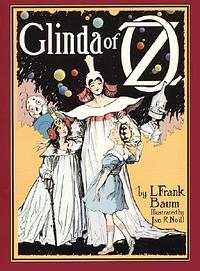Take a photo of a barcode or cover
So this is it, then. The last Oz book. In the end, I'm glad it came down to Dorothy and Ozma and Glinda, up against genuine peril and actually dealing with the difficulty in ruling and asserting authority when you aren't physically present (a fairly sophisticated political theme). While I might not have been enchanted, it did have everything I've always loved about Oz.
Way better than the rest of the original Oz series novels. I enjoyed how it didn't end with everyone traveling to Oz with whatever festivities there. The potential war could have been flushed out a bit more with what the false flat head leader was doing. Yet, the new characters were more enjoyable to see what happened to them. Still wished for more consistent story line to fully understand what was going on from one book to the next and less explaining characters who we all know from reading the previous books. It made it too tedious. I wonder if the author did that because not Ll children would know the full story from book 1 to present or if he thought they wouldn't remember.
adventurous
lighthearted
adventurous
fast-paced
Plot or Character Driven:
A mix
Strong character development:
No
Loveable characters:
No
Diverse cast of characters:
Complicated
Flaws of characters a main focus:
Yes
Even with the Wikipedia entry, I can barely recall any of this book. After the previous two Oz books, which were okay, if not phenomenal, I'm disappointed in how forgettable this last book is. There is, apparently, Ozma and Dorothy running around together and kissing women, which I'm always up for (the lesbian subtext between those two is really more text, to me), but the plot itself is nothing inspired.
lighthearted
Loveable characters:
No
Definitely not my favourite. The bad guys were unpleasant and the good guys were rather insufferable. The ending was also abrupt.
adventurous
adventurous
funny
lighthearted
mysterious
fast-paced
Plot or Character Driven:
Plot
Strong character development:
No
Loveable characters:
Yes
Diverse cast of characters:
Yes
Flaws of characters a main focus:
No
Not going any farther then this in the series since this is the last one L. Frank Baum wrote.
I'll be honest: as a kid, I didn't really like this one. It has probably the lowest quotient of "weirdness" to any Baum Oz book, partly because the major cast is entirely human or human-like, and the plot is almost entirely straightforward, without the little side-journeys and tangents that populate most of his earlier novels. As an adult, I appreciate it far more, which leads me to a fairly unusual appraisal:
Glinda of Oz is just an "okay" Oz book. It is, however, a great Baum book.
Although we know conclusively that Baum wrote this as an Oz book, it seems to share a lot more DNA with his other, non-Oz fantasies - in particular, with Sky Island, although it also feels part of the group that includes the more Europeanized Queen Zixi of Ix and King Rinkitink (well, what we have of King Rinkitink). Baum is once again concerned with two satirically opposed nations, one of whom is governed by a power-mad despot, the other by a witch-queen. (Sound familiar?) Both antagonists ultimately fade into the background once the original set of protagonists become trapped, and it's up to a "backup team" to save the day.
There's no real reason for it to be an Oz book at any point; Ozma and Dorothy's initial quest provides momentum, and Glinda (and her party) provides the resolution, but there's no overwhelming reason for it to be these characters. It might just as easily have been King Bud and Queen Fluff who went on the original mission, with their neighbor Zixi coming to the rescue. Both the Flatheads and Skeezers are blissfully unaware of comings and goings outside their limited area, so this might as well take place - well, on an island - as in the land of Oz.
Is that a failing? No, I don't think so, because the Oz characters don't appear grafted on, as they do in Rinkitink in Oz. It does make me wonder, though, if Baum originally sketched this out as another kind of fantasy - or even if he might have had a silent movie in mind. It seems like a plot that might have leant itself well to the special effects trickery of early cinema.
As with The Lost Princess of Oz and The Magic of Oz, Baum continues a fascination with the mechanisms of magic never really seen in his earlier books (where magic is performed without ritual or explanation). Here, we get complex descriptions of how Glinda and other characters research their magic and cast spells—not in some Harry Potter-type sense, but with an interest in alchemy that implies a stronger kinship to early science fiction than most children's books of the period. Here, as in The Tin Woodman of Oz, we also see Baum's interest in technological innovation, surely heightened by the advances of World War I: among submarines, automatic doors, and escalator-like conveyers. This is the only Oz book to so clearly align technology with magic, and while Baum never delves very deeply, it's intriguing to consider where his imagination might have gone next.
Sadly, we will never know. And while I still have trouble with this as a "traditional" Oz book, I enjoy it more and more as a story on its own merits, written by a man whose creativity never faltered. It's simply a very good read.
Glinda of Oz is just an "okay" Oz book. It is, however, a great Baum book.
Although we know conclusively that Baum wrote this as an Oz book, it seems to share a lot more DNA with his other, non-Oz fantasies - in particular, with Sky Island, although it also feels part of the group that includes the more Europeanized Queen Zixi of Ix and King Rinkitink (well, what we have of King Rinkitink). Baum is once again concerned with two satirically opposed nations, one of whom is governed by a power-mad despot, the other by a witch-queen. (Sound familiar?) Both antagonists ultimately fade into the background once the original set of protagonists become trapped, and it's up to a "backup team" to save the day.
There's no real reason for it to be an Oz book at any point; Ozma and Dorothy's initial quest provides momentum, and Glinda (and her party) provides the resolution, but there's no overwhelming reason for it to be these characters. It might just as easily have been King Bud and Queen Fluff who went on the original mission, with their neighbor Zixi coming to the rescue. Both the Flatheads and Skeezers are blissfully unaware of comings and goings outside their limited area, so this might as well take place - well, on an island - as in the land of Oz.
Is that a failing? No, I don't think so, because the Oz characters don't appear grafted on, as they do in Rinkitink in Oz. It does make me wonder, though, if Baum originally sketched this out as another kind of fantasy - or even if he might have had a silent movie in mind. It seems like a plot that might have leant itself well to the special effects trickery of early cinema.
As with The Lost Princess of Oz and The Magic of Oz, Baum continues a fascination with the mechanisms of magic never really seen in his earlier books (where magic is performed without ritual or explanation). Here, we get complex descriptions of how Glinda and other characters research their magic and cast spells—not in some Harry Potter-type sense, but with an interest in alchemy that implies a stronger kinship to early science fiction than most children's books of the period. Here, as in The Tin Woodman of Oz, we also see Baum's interest in technological innovation, surely heightened by the advances of World War I: among submarines, automatic doors, and escalator-like conveyers. This is the only Oz book to so clearly align technology with magic, and while Baum never delves very deeply, it's intriguing to consider where his imagination might have gone next.
Sadly, we will never know. And while I still have trouble with this as a "traditional" Oz book, I enjoy it more and more as a story on its own merits, written by a man whose creativity never faltered. It's simply a very good read.






